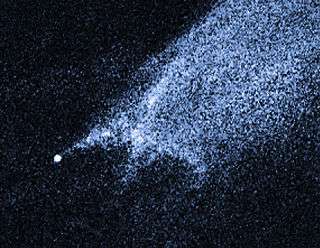2010 AA15
|
| |
| Discovery[1] | |
|---|---|
| Discovery site | Mount Lemmon Survey [G96] |
| Discovery date | January 07, 2010 |
| Designations | |
| Main-belt asteroid[1] | |
| Orbital characteristics[1] | |
| Epoch 13 January 2016 (JD 2457400.5) | |
| Uncertainty parameter 6 | |
| Aphelion | 2.6334 AU (393.95 Gm) (Q) |
| Perihelion | 1.9927 AU (298.10 Gm) (q) |
| 2.3131 AU (346.03 Gm) (a) | |
| Eccentricity | 0.13849 (e) |
| 3.52 yr (1284.9 d) | |
| 254.91° (M) | |
| 0° 16m 48.612s /day (n) | |
| Inclination | 4.6855° (i) |
| 324.07° (Ω) | |
| 142.72° (ω) | |
| Earth MOID | 1.01162 AU (151.336 Gm) |
| Jupiter MOID | 2.48414 AU (371.622 Gm) |
| Physical characteristics | |
| Dimensions | 290-983 meters[2] |
| unknown | |
| ~21 | |
| 19.254 ± 0.34681[1] | |
|
| |
Asteroid 2010 AA15 is in a similar but different orbit than main-belt comet P/2010 A2.[3] Using the best-fit short-arc orbital data, it appears as if the closest that comet P/2010 A2 came to asteroid 2010 AA15 is around 0.0155 AU (2,300,000 kilometres (1,400,000 mi)) on November 22, 2009.[3]
2010 AA15 was discovered on January 7, 2010.[1] Since it has only been observed over a fifteen-day arc of its 3.5 year orbit, details of the exact orbit still need further refining for easy recovery of this object in the distant future.[1] The asteroid appears to have come to perihelion (closest approach to the Sun) on around January 10, 2010,[1] only a couple days after its discovery.
With an absolute magnitude (H) of 19.2,[1] 2010 AA15 is likely about 600 metres (2,000 ft) in diameter.[2]
References
- 1 2 3 4 5 6 7 8 "JPL Small-Body Database Browser: (2010 AA15)" (2010-01-22 last obs). Retrieved 31 March 2016.
- 1 2 "Absolute Magnitude (H)". NASA/JPL. Archived from the original on 9 February 2010. Retrieved 2010-02-03.
- 1 2 Ireneusz Wlodarczyk (2010-02-03). "Re: {MPML} P/2010 A2, 2010 AA15 results of a collision? (probably no)". Yahoo! Groups (Minor Planet Mailing List). Retrieved 2010-02-03.
External links
- Orbital simulation from JPL (Java) / Horizons Ephemeris
- 2010 AA15 at the JPL Small-Body Database

